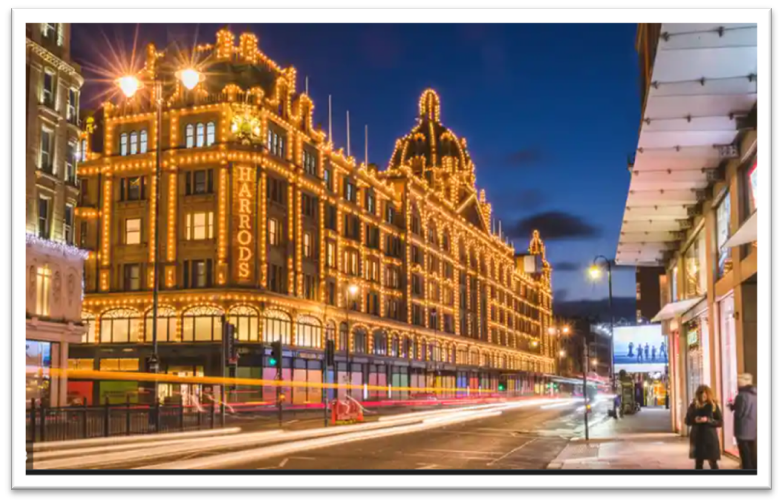Today the writing challenge is heading to one of the most celebrated department stores in the world, Harrods of London. It might not strictly meet the brief of places of historical significance, and I appreciate any concern you might have on the matter, and any confusion or inconvenience caused, but Harrods has a long history. And it’s my blog. Also, disclaimer, Harrods is absolutely my favourite.
In term of shopping centres, it doesn’t get any more exclusive that Harrods, which has voted itself the “world’s most famous department store”, and who can disagree with the GOAT.
The largest department store in Europe, it is the land of opulence and luxury, lavishness and magnificence, with more than 300 in-house departments in store, and 100,000m2 of fancy handbags, Prada gold clubs and all of the other fabulousness they stock on their shelves. They probably don’t call them shelves; that is too…..Sainsburys. They probably call then product royal mantels, or something.
Harrods came from modest little beginnings, as everything must do at some point. In 1832, a wee London East End grocery store was established and named after its owner, Mr Harrod. Mr Harrod developed a business portfolio and had some stores about town, that sold various items for which Harrods is now synonymous, but on a much less grander scale.
The site on which Harrods stands now became a key
asset for Mr Harrod and sold perfumes, stationary, medicines and fruit and
vegetables. It was not unusual to bump into Sigmund Freud or Oscar Wilde at the
checkouts, with Freud psychoanalysing your shopping basket and determining that
your Id is well and truly in charge of your grocery list.
Harrods was first to introduce an escalator, because you can’t have Mr Freud wasting all his thought time trying to negotiate stairs when he’s busy psychoanalysing customers. Speaking of psychotic, in the early days, Harrods used to also sell cocaine. In 1916, it used to sell a kit containing cocaine, morphine, syringes and needles, as a present to send to friends on the front in the war.
And at one point, the store used live snakes to guard expensive jewellery and also introduced the selling of exotic animals including panthers, alligators and lions. Which is awful and extremely random but also so very Edwardian era. In more uplifting news, Harrods has a chip shop in its food and beverage enclave.
It
also has a fabulous souvenir gift store. I own one of Harrods signature items,
a shiny olive green tote bag that they sell to the innumerable tourists who
pass through the checkouts. I also own a grey one. I’m a sucker for this sort
of stuff and have never met a London souvenir that I have not fell instantly in
love with in a very serious way. I’ve got three pens that look like the London Buckingham
Palace guards, and you press their fur hat to click the pen open. Adorable.
And here’s a cool thing. The new head honcho pastry chef at Harrods is an Aussie. Philip Khoury started working there in 2018 and in December 2021 he was appointed the boss of all things sweet tooth. What a gig!
In this time, he has begun pioneering plant-based dessert, which he calls the “last frontier” of vegan cuisine, rethinking the traditional eggs and dairy based model as the holy grail of exceptional desserts. Apparently kicking out dairy from the recipe allows other flavours to pop.
This is interesting, as the global plant-based food market is expected to reach $USD70 million in the next five years, and certainly is projected to double in the UK in that time. Presumably this is a calculated move by Harrods to play in the USD$7 billion plant-based food market (up from USD$5.5 billion in 2019) as consumers are more and more aware around issues relating to food sustainability and nutrition of the products they are consuming. And with up to 300,000 customers a day at its peak, Harrods has an influential role to play.
And if you are lucky enough to visit the beautiful, gargantuan money spinner that is Harrods, and need somewhere to park the Ferrari or the Vauxhall Astra, there is a single carpark nearby that you can buy for a cool £85,000, which is ostensibly about £84,995 more expensive than other parks in the area.
It comes with a fob, CCTV, a water supply (unclear if they mean a tap, or an Agean Sea type body of water), and a 960 year lease. Yeah, I give the Ferrari engine three months before it blows, let alone 960 years. Or you can just take the Tube like the rest of London.


No comments:
Post a Comment